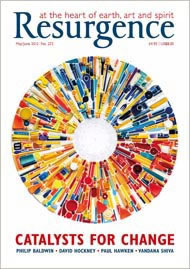Tectonic plates are shifting. The Arab Spring, the banking crisis, hunger, obesity, environmental degradation, climate change – all are symptomatic of a world in trouble. It has been said too that the Occupy movement is against lots of things but has failed to articulate an alternative vision of society or explain how we might get there.
Into the vacuum comes His Holiness, “the most influential man in the world”, according to Time magazine. In this slim but priceless book, the Dalai Lama – now 76 years old – distills a lifetime of learning into simple, practical steps that would make the world a better place.
“If you are able, you should help others. If you are not able, you should at least not harm others... This is my simple religion. No need for temples. No need for complicated philosophy. Your own mind, your own heart is the temple; the philosophy is simple kindness.”
Of course, this is not the first time we have heard this! Perhaps it was the parable of the Good Samaritan? This book shows us that – whatever the wrapper, whatever we call it – the only religion is love.
If selfishness is part of our nature, His Holiness points out that we can at least be “wisely selfish”. Once we realise that being compassionate to others makes them more warm- hearted and harmonious, we see happiness boomeranging back to ourselves. Putting the interests of others before ourselves is actually in our own self-interest.
The greatest difficulties in life can be turned to advantage if only we can see them in perspective. The euro crisis isn’t so bad if you remember the impermanence of all things. We can come to terms with sickness if we pray that it is “the ripening, manifestation, and conclusion of many bad karmas that I have accumulated”. Through moderating our desires we can not only improve our own lives (for example, overcoming obesity and freeing ourselves from the tyranny of material accumulation) but simultaneously be of service to others, including generations to come, by placing fewer demands on the planet and combating climate change.
The most poignant passages in the book deal with personal experience and the lifelong suffering of the people of Tibet. Whilst we worry about debt and unemployment, His Holiness’s engagement with adversity has been on a different scale. When he says “hard times can build determination and inner strength”, we know he has witnessed the invasion of his country and seen genocide inflicted on his people. And yet, despite 50 years of ruthless oppression, he is able to say: “enemies are very valuable for the opportunities they provide”.
He tells the story of the Namgyal monk who, imprisoned for 18 years, confesses that he faced grave danger on a few occasions. When the Dalai Lama asks, “What danger?” the monk replies, “Losing compassion toward the Chinese.”
The Dalai Lama reminds us of the precious nature of human life and the special responsibility we bear, simply by being alive. We need to overcome our obsession with material possessions and the trivia of life, and remind ourselves that one day everything will disintegrate. No amount of money can buy us extra time. We leave it all behind. So we should seize the moment and use this fleeting lifetime to create peace and goodwill amongst people, and harmony between people and Nature.
In our heart of hearts, we know we can’t continue on the current path. If ‘growth’ is the only thing that can get us out of debt, ‘growth’ in a finite world will also be our undoing. Once we realise that the thing we most desire is actually going to kill us, we know that – in one way or another – change is coming.
Once we acknowledge that ‘business as usual’ is going to end in tears, there’s no alternative to trying to do things differently. One era is ending. This book shows us how to begin another – and we can all start today.
The Dalai Lama will be visiting Manchester, London, Edinburgh, Dundee and Inverness from 16 to 23 June, 2012, giving public teachings and promoting the cause of nonviolence. For more information see www.dalailama.com






